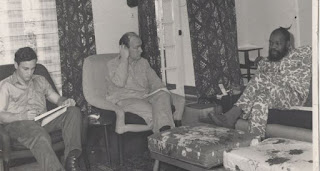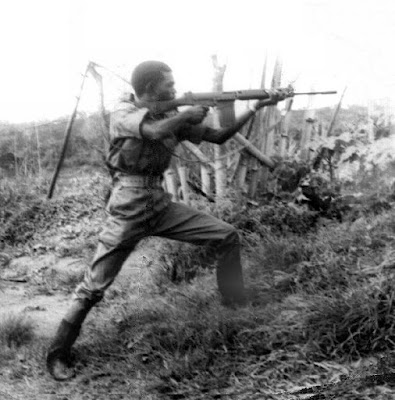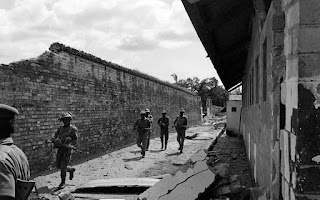BIAFRA: The Irish Involvement
John Horgan (centre) interviewed Odumegwu Ojukwu, then president of the secessionist state of Biafra, for ‘The Irish Times’ in 1967. Image: Irish Times
Famine and independence struggle led to Irish support for Biafran secession in 1967
Famine and independence struggle led to Irish support for Biafran secession in 1967
BY JOHN HORGAN
The stage was set, effectively, not only for conflict over the national control of resources, but for a proxy war involving two former colonial powers.
The second factor was religion – not any of the African religions of the region, but Christianity, and specifically, in the case of Biafra, Catholicism. Since the early 20th century, Irish Catholic missionaries in particular had made eastern Nigeria (coterminous with the newly created Biafra) a core pays de mission.
In 1967, many of these missionaries – seeing historical parallels between Biafra and the Irish independence struggle – adopted the Biafran cause with great commitment and skill, and began to canvass Irish public opinion for support.
Even at that, it took almost a year before Irish media began to respond. At that point Irish Times editor Douglas Gageby sent me out to report on a situation that was beginning to attract enormous Irish interest. I was only the second English-speaking reporter to visit Biafra (the first had been Harrison Salisbury of the New York Times); and later Frederick Forsyth and others became powerful advocates for the Biafran cause.
The political and diplomatic tensions also increased. In January 1968, just before I went out, Kevin McCourt, then director general of RTÉ, after seeking advice from the department of external affairs, intervened to prevent an RTÉ team (which had got as far as Lisbon) from travelling further.
At this stage, the federal Nigerian authorities had consciously adopted a strategy that would recur half a century later in the Middle East conflict: starvation. As one of the federal government leaders said at the time: “I don’t see why we should feed our enemies in order for them to fight harder.”
The threat of famine, combined with an independence struggle, had an almost irresistible political and emotional impact on Irish public opinion, which became hugely supportive of the regular airlifts, via the off-shore Portuguese island of São Tomé, of food and medical supplies to the beleaguered infant republic.
At this remove, it is somewhat embarrassing to have to admit that these factors largely conditioned much of Irish reporting at that time – including my own – to the detriment of any analysis of the geo-politics of oil that were involved.
In the circumstances, many of our articles focused on the ethnic aspects of the problem, and the 35-year-old Biafran leader, when I interviewed him, placed enormous emphasis on these.
If either of us had dived for cover, the other would have followed
He was an accomplished public speaker, and the bushy black beard which framed his young face contributed to his impressive, pleasantly Mephistophelian aura, as he spoke with obvious determination, even passion, about his desire to spare Biafra the ethnic and tribal tensions which had riven the rest of the country.
Afterwards, as we sat on his balcony, both of us became aware of a low, distant, jet engine note in the sky. Each of us knew what it meant. Biafra did not have an air force: the only planes in the sky were Russian MiGs piloted by Egyptian mercenaries, which regularly attacked Biafran targets.
Ojukwu and I looked at each other. Nothing was said, but I suspect that the same thought was going through each of our minds. If either of us had dived for cover, the other would have followed. He didn’t make a move. My courage draining rapidly into my boots, I stayed too, and stuttered to the end of the interview.
Communications with Dublin were almost non-existent. I later learned that Gageby would inquire occasionally at the morning news conferences whether anyone had heard from me, adding – political incorrectly – “Has he, perhaps, been eaten?”
...The threat of famine, combined with an independence struggle, had an almost irresistible political and emotional impact on Irish public opinion
The stage was set, effectively, not only for conflict over the national control of resources, but for a proxy war involving two former colonial powers.
The second factor was religion – not any of the African religions of the region, but Christianity, and specifically, in the case of Biafra, Catholicism. Since the early 20th century, Irish Catholic missionaries in particular had made eastern Nigeria (coterminous with the newly created Biafra) a core pays de mission.
In 1967, many of these missionaries – seeing historical parallels between Biafra and the Irish independence struggle – adopted the Biafran cause with great commitment and skill, and began to canvass Irish public opinion for support.
Even at that, it took almost a year before Irish media began to respond. At that point Irish Times editor Douglas Gageby sent me out to report on a situation that was beginning to attract enormous Irish interest. I was only the second English-speaking reporter to visit Biafra (the first had been Harrison Salisbury of the New York Times); and later Frederick Forsyth and others became powerful advocates for the Biafran cause.
The political and diplomatic tensions also increased. In January 1968, just before I went out, Kevin McCourt, then director general of RTÉ, after seeking advice from the department of external affairs, intervened to prevent an RTÉ team (which had got as far as Lisbon) from travelling further.
At this stage, the federal Nigerian authorities had consciously adopted a strategy that would recur half a century later in the Middle East conflict: starvation. As one of the federal government leaders said at the time: “I don’t see why we should feed our enemies in order for them to fight harder.”
The threat of famine, combined with an independence struggle, had an almost irresistible political and emotional impact on Irish public opinion, which became hugely supportive of the regular airlifts, via the off-shore Portuguese island of São Tomé, of food and medical supplies to the beleaguered infant republic.
At this remove, it is somewhat embarrassing to have to admit that these factors largely conditioned much of Irish reporting at that time – including my own – to the detriment of any analysis of the geo-politics of oil that were involved.
In the circumstances, many of our articles focused on the ethnic aspects of the problem, and the 35-year-old Biafran leader, when I interviewed him, placed enormous emphasis on these.
If either of us had dived for cover, the other would have followed
He was an accomplished public speaker, and the bushy black beard which framed his young face contributed to his impressive, pleasantly Mephistophelian aura, as he spoke with obvious determination, even passion, about his desire to spare Biafra the ethnic and tribal tensions which had riven the rest of the country.
Afterwards, as we sat on his balcony, both of us became aware of a low, distant, jet engine note in the sky. Each of us knew what it meant. Biafra did not have an air force: the only planes in the sky were Russian MiGs piloted by Egyptian mercenaries, which regularly attacked Biafran targets.
Ojukwu and I looked at each other. Nothing was said, but I suspect that the same thought was going through each of our minds. If either of us had dived for cover, the other would have followed. He didn’t make a move. My courage draining rapidly into my boots, I stayed too, and stuttered to the end of the interview.
Communications with Dublin were almost non-existent. I later learned that Gageby would inquire occasionally at the morning news conferences whether anyone had heard from me, adding – political incorrectly – “Has he, perhaps, been eaten?”
SOURCE: THE IRISH TIMES




Comments